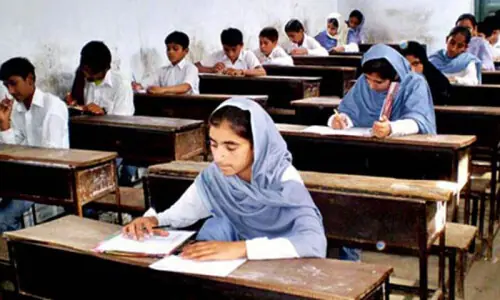RAWALPINDI: Health professionals, social workers and public and private schools were urged to work together to protect children from sexual abuse at a seminar on Friday.
Speakers also emphasised the need for parents and teachers to be attentive towards the development of a child’s personality.
The seminar, titled Un Kahi, was arranged by the Institute of Psychiatry at the Benazir Bhutto Hospital and the World Health Organisation Collaboration Centre. It aimed to raise awareness amongst government and non-government organisations to come together and end child sexual abuse in society.
The speakers included the head of the BBH Institute of Psychiatry Prof Fareed A. Minhas, Rozen Executive Director Dr Ambareen Ahmed, assistant professor of psychiatry and head of the child psychiatry unit Dr Ayesha Minhas, Sahil Executive Director Dr Manizeh Bano and the Child Protection Bureau representative Nadia Ahmed.
The seminar was also attended by representatives from St Ainee’s Convent, Siddique Public School, St Mary’s and Beaconhouse.
Seminar calls on health professionals, social workers, schools to protect children from sexual abuse
A semi-fictional film, produced by the institute, was also screened at the event.
During the seminar, Prof Minhas spoke about the emotional development and growth of children, and said we were liable to ignore a very unfortunate phenomenon that is prevalent in society, as it is in many other societies.
“As stigmatised as psychiatry is, the issue of child sex abuse is even more stigmatised. Beyond the corridors of psychiatry, this is an issue for schools to be aware of,” he said.
He called educational institutions the initial line of defence in helping to identify and help victims, and praised the role of NGOs and their contribution to this. He said this is a collaborative effort and a partnership with NGOs and schools is inevitable, as the Institute of Psychiatry is incapable of dealing with alone because of its magnitude.
Dr Ahmed said there is a common misconception that child sexual abuse only means rape, but the phrase is actually more comprehensive.
While speaking on the prevalence of the problem, she said one in five girls and one in 20 boys in the United States are victims, and very preliminary figures suggest that one in 10 children in Pakistan may be affected.
She said wherever there is a lack of supervision, or a lack or decrease in emotional care, children become more vulnerable, but warned that children who have supervision and emotional care can still be at risk.
“Most abusers – around 90pc – are male, but females are also implicated, contrary to the popular perception. The majority of children are abused by close relatives. The perpetrators may have been abused themselves in the past,” she explained.
“Trauma in childhood will impact the structure of the brain. These changes are then associated with lifelong psychopathologies. A very important determinant of how the person is going to recover is the response of the family – the family needs help as well,” she said.
Dr Minhas from the child psychiatry unit shared her experience setting up a child psychiatry service at the institute, which was the only public sector mental health facility in the region.
She spoke on common mental health conditions facing children and divided them into three main categories: developmental, behavioural and emotional disorders.
“One component of it addresses teachers, as schools are the primary place where children spend the maximum amount of their time and where key features about the self and its protection can be taught,” she said.
Sahil’s Dr Bano said that to date the organisation has seen a total of 3,768 child sexual abuse cases – 1,974 victims were girls and 1,794 were boys. An age-wise breakdown showed that children between the ages of six and 10, and 11 and 15 were the most vulnerable.
CPB representative Nadia Ahmed said people did not want to talk about child sexual abuse because society responds negatively when such cases occur, and would rather protect the abuser than the victim.
Naeem Iqbal from St Mary’s said teachers need to be trained by experts on how to deal with this issue, and called for a central policy to introduce such subjects in the curriculum, while Amina from Beaconhouse told the seminar participants about a curriculum that has been developed that addresses such aspects.
Published in Dawn, February 18th, 2017

































